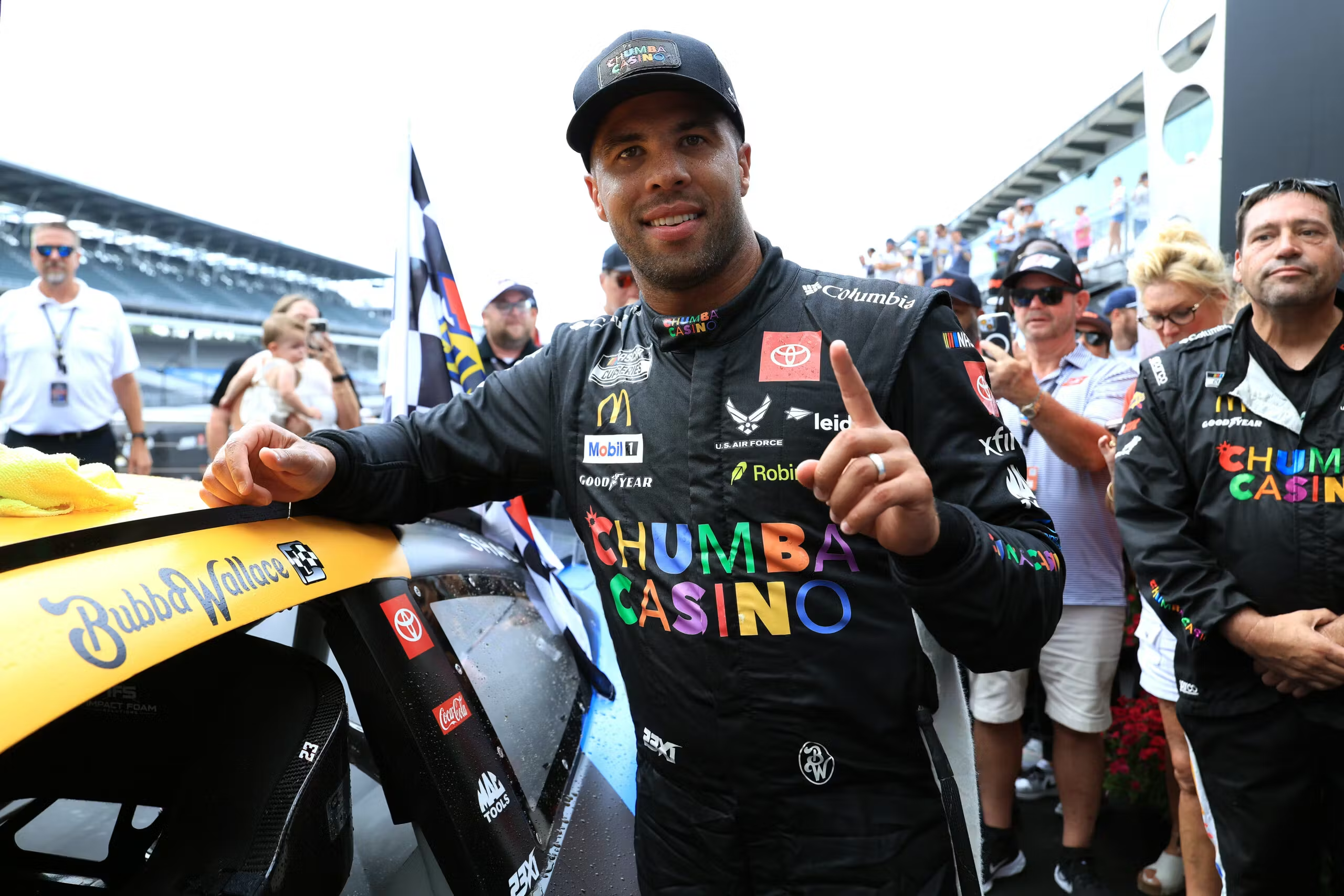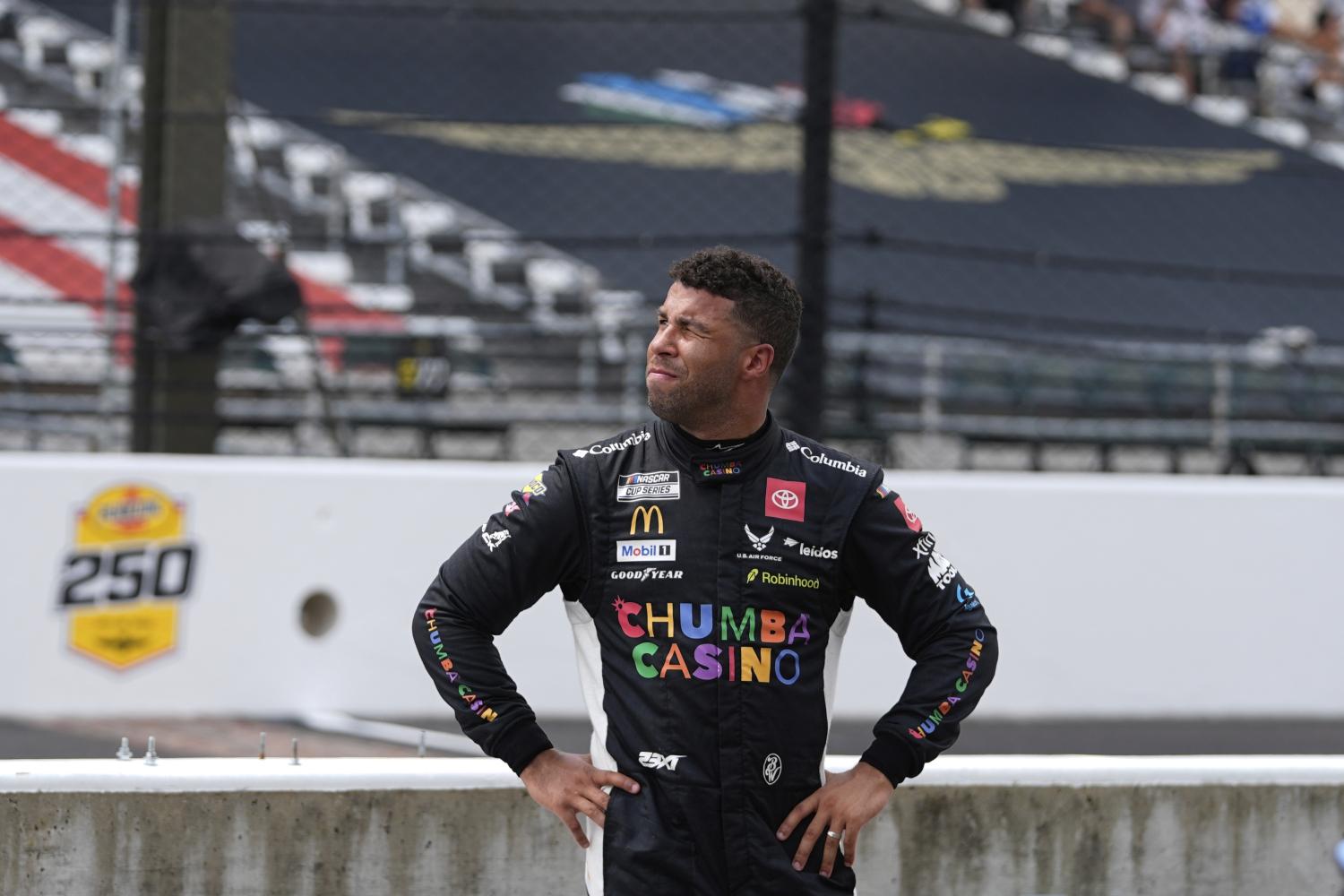He walked out—no PR rep, no script, no sponsor behind him.
In the middle of the “No Kings Day” storm that’s tearing through NASCAR, Bubba Wallace looked straight into the cameras and dropped twelve words that shook the foundation of American motorsport.

“We race for respect — not for kings, not for crowns.”
Just 12 words. Not a speech, not a manifesto—a shot fired through the noise.
One click of the mic, and NASCAR would never sound the same again.

“No Kings Day”: When NASCAR became a battlefield of pride and justice
It started small.
A few young drivers unfurled a banner reading:
“No Kings. No Crowns. Just Drivers.”
It was supposed to be a message about equality and fairness—a reminder that racing should be about talent, not hierarchy.
But in less than 48 hours, it spread like wildfire across social media—millions of shares, thousands of debates, and hundreds of arguments.
One side called it a necessary rebellion, a movement against favoritism and the “royalty system” that rewards established stars like Denny Hamlin, Kyle Busch, or Kevin Harvick.
The other side branded it disrespectful—a slap in the face to the legends who built NASCAR’s legacy.
When things escalated, NASCAR issued a “neutral” statement:
“We celebrate all voices — but unity must remain the heart of racing.”
It didn’t help.
Because “all voices” also meant Bubba Wallace, and the whole country was waiting for his.
The dangerous silence: Bubba Wallace refuses to speak
Why wasn’t Bubba saying anything?
That question haunted fans and media alike for days.
Speculation flooded social media:
“Is he being silenced by NASCAR?”
“Is he scared of losing sponsors?”
“Or is he waiting for the perfect moment?”
An Athletic journalist wrote:
“Bubba isn’t just silent. He’s loading.”
Exactly. He was loading.
That silence wasn’t weakness—it was the pull of a bowstring before the arrow flies.
The moment it exploded: 12 words that lit the fuse
One hour ago, at the Talladega Media Center, Bubba walked in. Lights flashed. Dozens of cameras clicked.
Nobody knew what he was going to say.
Then, with icy calm, he spoke.
“We race for respect — not for kings, not for crowns.”
The room froze.
One second. Two seconds. Then—applause erupted.
Ross Chastain, one of his fiercest rivals, nodded quietly.
An ESPN reporter whispered:
“That wasn’t a quote. That was a declaration.”
Within minutes, #RaceForRespect and #NoKingsDay were the #1 trending topics in America.
Every pit wall, every group chat, every NASCAR forum was on fire.
NASCAR’s response: “We support passion, but not division.”
Moments later, NASCAR issued a carefully worded press release:
“We encourage passion but discourage division. Racing must unite, not divide.”
Short. Polished. But ice cold.
Critics called it a “corporate containment line”—a way to appear neutral while quietly panicking behind closed doors.
A viral comment on X summed it up:
“They built kings. Bubba built courage.”
It was retweeted over 120,000 times in 30 minutes.
NASCAR might control the race track—but they no longer control the narrative.
The veterans strike back: “Legacy Forever” vs. “No Kings Day”
When #NoKingsDay swept through the paddock, a group of veteran drivers decided to push back.
They rolled out a banner that read:
“Legacy Forever – Without Kings, There’s No Kingdom.”
Denny Hamlin, visibly irritated, told reporters:
“You can’t erase the roots of this sport just because you want a headline.”
That comment poured gasoline on an already blazing fire.
Younger drivers clapped back:
“We’re not erasing history. We’re writing the next chapter.”
A source told Fox Sports:
“This isn’t just a protest anymore — it’s a revolution inside NASCAR.”
And once again, Bubba Wallace found himself at the epicenter.
A new symbol: “Silence doesn’t mean surrender — it means I’m loading.”
Hours later, Bubba posted a black-and-white photo on Instagram—his gloves lying next to his helmet.
The caption read:
“Silence doesn’t mean surrender — it means I’m loading.”
Boom.
That line exploded across the internet.
It became a meme, a slogan, a rallying cry.
Every major motorsport outlet shared it — Bleacher Report Racing, Racing Pulse, The Checkered Flag.
A viral comment said it best:
“He didn’t just break silence. He broke the system.”
Uneasy alliances and quiet isolation
Down in the Charlotte paddock, the atmosphere was tense—electric, almost cinematic.
Some younger drivers approached Bubba, offering half-smiles and cautious handshakes.
But behind the scenes, sponsors were reportedly reviewing their contracts.
An insider told ESPN Racing Insider:
“He’s walking a thin line. But sometimes, that’s where history begins.”
Rumors swirled that several major backers were divided between standing with Bubba and protecting NASCAR’s image.
Fans react: admiration, backlash, and undeniable respect
The NASCAR fanbase hasn’t been this divided in years.
One camp hails Bubba as “the voice of a new generation”,
while the other accuses him of “tearing down the sport’s foundation.”
But here’s the twist—both sides respect him.
Because whether you love him or hate him, you can’t deny one thing:
Bubba Wallace dares to say what others won’t.
LeBron James tweeted:
“Respect over crowns. That’s leadership.”
Damian Lillard added:
“12 words. Infinite impact.”
The mirror moment: NASCAR forced to look at itself
Amid the hashtags, headlines, and heated debates, one truth remains — this is bigger than Bubba Wallace.
It’s a reflection of a sport — and maybe a country — caught between tradition and transformation.
Bubba didn’t declare war on NASCAR.
He declared war on silence.
And sometimes, silence is the loudest explosion of all.
“We race for respect — not for kings, not for crowns.”
One quote. One declaration.
A moment that might redefine how NASCAR—and America—looks at itself.


